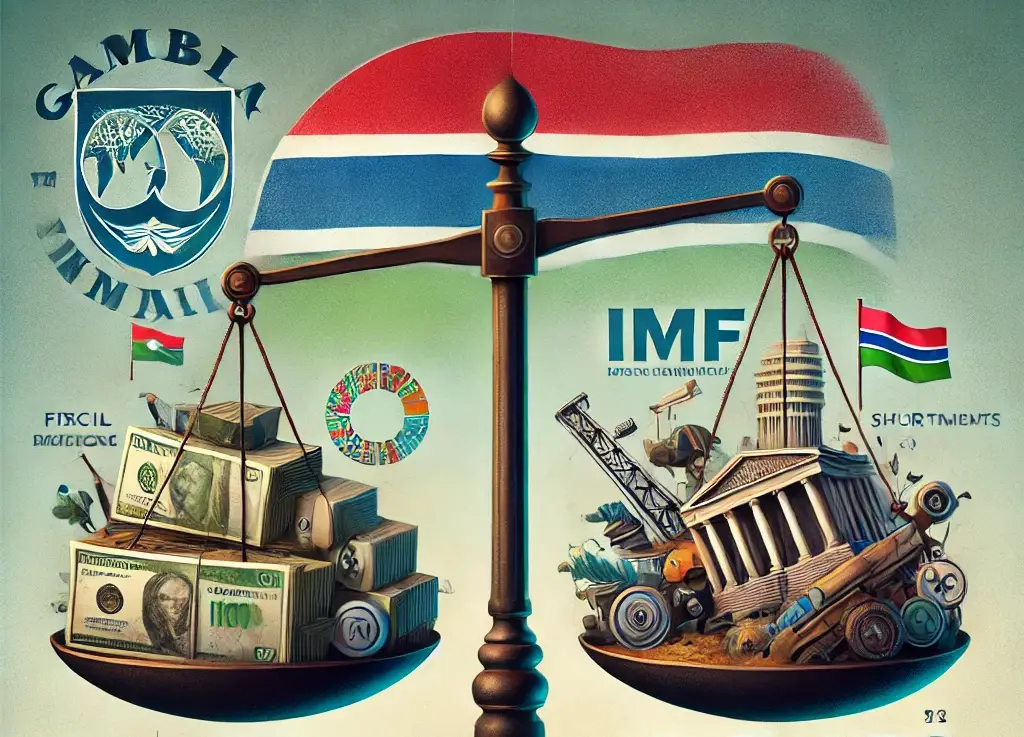Gambiaj.com – (Banjul, The Gambia) – The Government of The Gambia has reached a staff-level agreement with the International Monetary Fund (IMF) on the third review of its Extended Credit Facility (ECF)-supported economic program, paving the way for a potential disbursement of SDR 12.44 million (approximately US$16.8 million), pending approval by the IMF Executive Board.
This brings the cumulative total disbursement under the 36-month ECF arrangement—approved in January 2024 for SDR 74.64 million (around US$100.9 million)—to SDR 37.71 million (about US$51.0 million).
In addition to the ECF review, agreement was also reached on The Gambia’s request for access under the IMF’s Resilience and Sustainability Facility (RSF), potentially unlocking SDR 46.65 million (around US$65 million). The RSF aims to support long-term climate adaptation and macroeconomic stability. The IMF Executive Board is expected to consider both requests by mid-June 2025.
Gambia’s Commitments and Path Forward
In a statement concluding the IMF team’s visit from April 2 to April 16, IMF mission chief Ms. Eva Jenkner acknowledged strengthening economic activity, particularly in tourism and construction, and noted that inflation had declined to 9.1 percent in March.
However, fiscal performance fell short of expectations due to unbudgeted expenditures, including emergency transfers to the National Water and Electricity Corporation (NAWEC) and preparations for the OIC summit.
Despite these fiscal pressures, The Gambia reaffirmed its commitment to meeting the program’s quantitative targets and structural reforms. Out of seven performance criteria, only the ceiling on net domestic borrowing was missed.
To address the shortfalls and ensure program continuity, the government pledged to reinforce fiscal discipline in 2025 and beyond, ensuring spending aligns with budgetary plans. Another commitment is to tighten controls on unbudgeted expenditures, particularly support to SOEs like NAWEC and projects linked to earmarked revenues.
The Gambian government has also agreed to settle unpaid commitments from 2024, estimated at 0.4 percent of GDP, and advance key structural reforms, including improved public procurement, SOE management, social registry expansion, and transparent budgeting.
In fine, The Gambia must strengthen debt sustainability, maintaining the downward trend of the public debt-to-GDP ratio.
Central Bank Commitments and Climate Agenda and RSF Reforms
The Central Bank of The Gambia (CBG) also pledged to curb inflation towards its 5 percent medium-term target and ensure exchange rate flexibility by limiting interventions to moments of excessive volatility. Furthermore, it committed to strengthening financial sector resilience, particularly in light of elevated non-performing loans.
The staff-level agreement under the RSF reflects The Gambia’s ambitious climate agenda. The country has committed to reforms in five key areas, including institutional framework for climate governance, green public financial management, climate data integration and development of a green financial sector, adaptation and resilience strategies, and transition toward sustainable energy.
These reforms aim to mobilize additional climate financing, enhance long-term macroeconomic resilience, and reduce dependence on fossil fuels. They will be supported by technical assistance from the IMF and other development partners.
Governance, Anti-Corruption Efforts, and Ongoing Collaboration
Building on its Governance Diagnostic Roadmap published in December 2024, The Gambia also committed to deepening anti-corruption measures, enhancing public service delivery, increasing citizen access to financial and legal information, and improving the business environment to encourage private investment.
The IMF mission met with key stakeholders, including Minister of Finance Seedy Keita, Attorney General Dawda Jallow, CBG Governor Buah Saidy, and other senior officials. Consultations were also held with civil society, the private sector, and development partners.
Ms. Eva Jenkner, who led the IMF team, concluded the mission by expressing continued IMF support: “The IMF will continue to work closely with the Gambian authorities and stands ready to help them through financing, policy advice, and strong technical assistance.”
The expected mid-June IMF Board decision could mark a significant step in The Gambia’s dual pursuit of macroeconomic stability and climate resilience.










